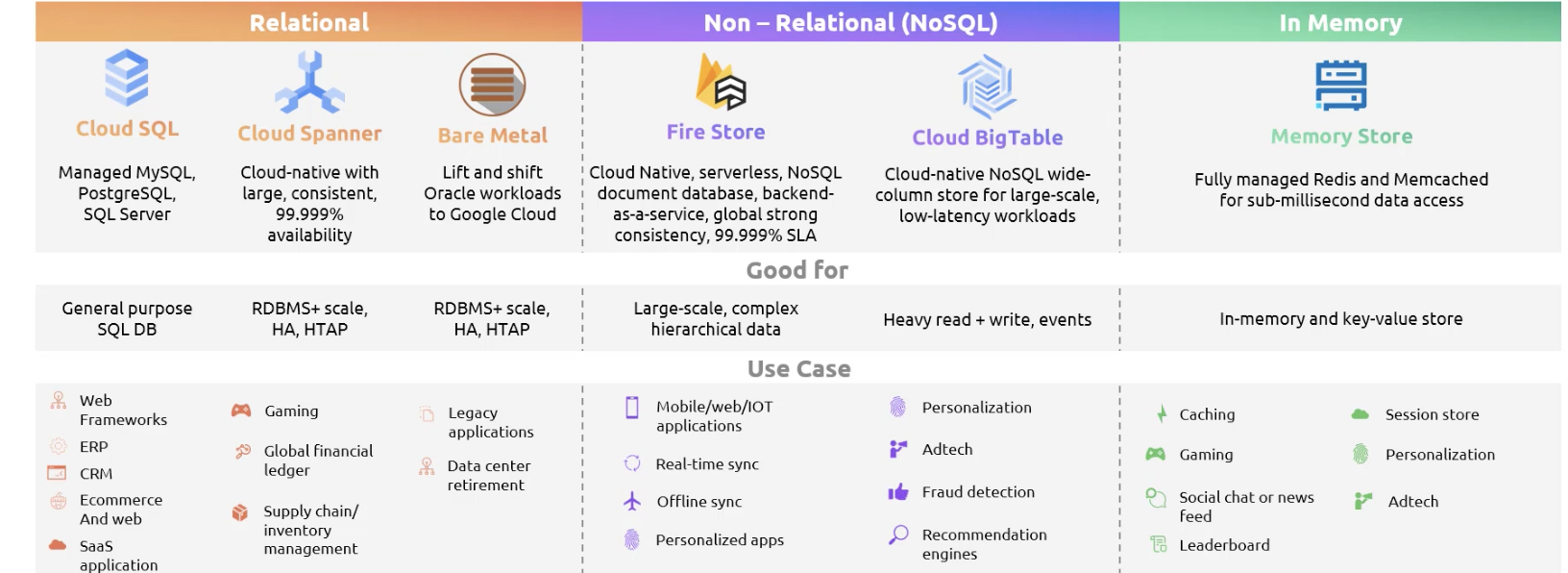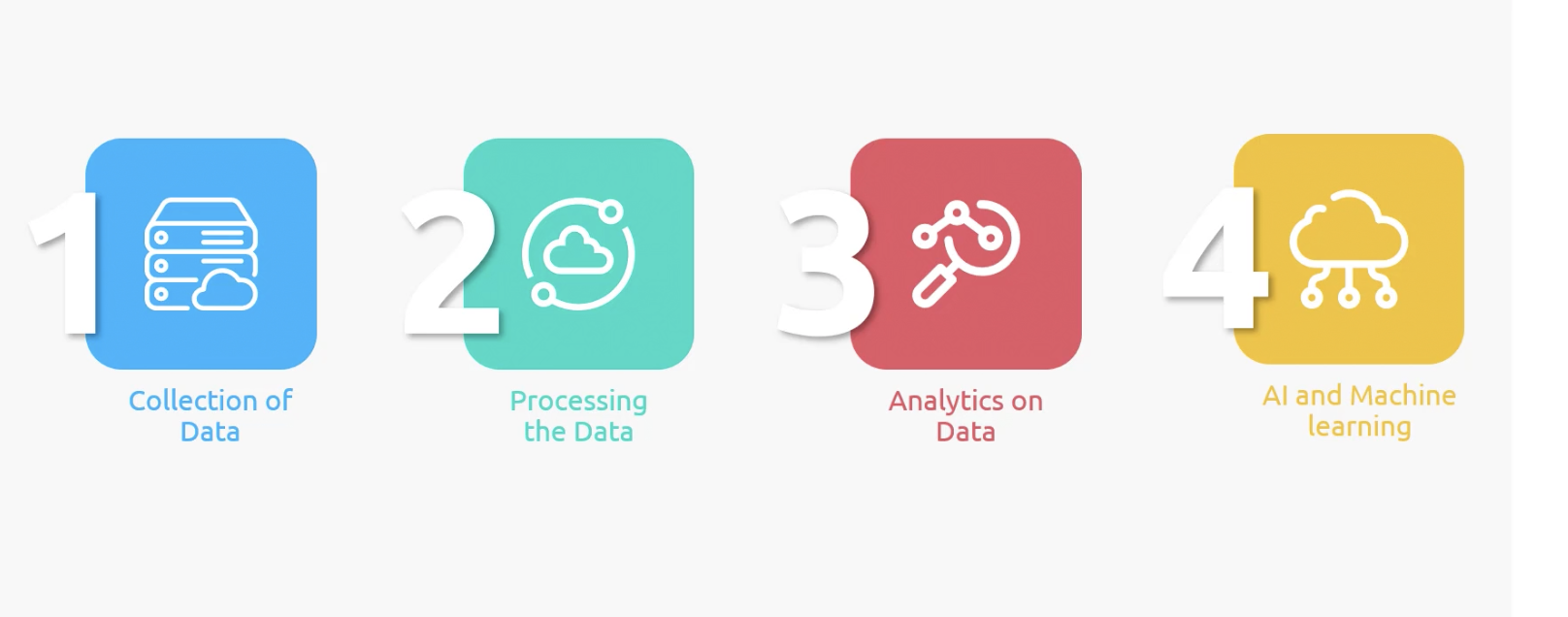A Beginner's Guide to Google Cloud Platform
 Abdullah Farhan
Abdullah Farhan
Continuing from my previous article on Google Cloud Platform (GCP), let's delve deeper into its offerings and explore more advanced features and services that GCP provides.
Introduction to Google Cloud Platform: A Beginner's Guide
Database in GCP
Cloud SQL: A fully managed service for MySQL, PostgreSQL, and SQL Server databases.
Cloud Spanner: A cloud-native database offering unlimited scalability, global consistency, and up to 99.9999% availability. It can handle over 2 billion requests per second, making it ideal for users of databases like Oracle or DynamoDB.
AlloyDB for PostgreSQL: A fully managed, PostgreSQL-compatible database.
Cloud Bigtable: A high-performance, fully managed NoSQL database.
SQL vs. NoSQL Databases
SQL: Includes Cloud SQL and Cloud Spanner.
NoSQL: Includes Cloud Bigtable, Memorystore, and Firestore.

Object storage
How can we store unstructured data like files and images? These types of data can't be efficiently stored in volumes or databases. Instead, we can use object storage. Google's storage service is ideal for this purpose.
Object storage is designed to handle large amounts of unstructured data. It's best for storing static data that doesn't have a hierarchical structure. Google Cloud Storage, also known as buckets, can store any kind of data with a very high storage capacity limit. It's a pay-as-you-go service, making retrieval easy.
Features include:
Turbo Replication: Replicates 100% of data between regions in less than 15 minutes.
Durability: 99.999999% chance of data loss is very low.
Use cases include media storage, big data analytics, IoT, backup, and archiving.
Storage Class
What happens to data stored a year ago? Is it still needed? We might not be using it, but we're still paying for it. We can't just delete this data. This is where storage class concepts come in. Archive storage and coldline storage are suitable for data not needed daily because retrieval takes longer compared to Nearline or Standard storage.

GCP for AI and Machine Learning
Google Cloud Platform (GCP) offers a robust suite of tools and services for AI and machine learning, enabling businesses to harness the power of data-driven insights. GCP's AI and machine learning services are designed to be scalable, flexible, and easy to integrate into existing workflows, making it an ideal choice for organizations looking to innovate and optimize their operations.
4Vs of Big Data
Volume: Refers to the vast amounts of data generated every second. GCP provides scalable storage solutions like BigQuery and Cloud Storage to handle large datasets efficiently.
Velocity: Describes the speed at which data is generated and processed. GCP's tools like Dataflow and Pub/Sub enable real-time data processing and streaming analytics, ensuring timely insights.
Variety: Encompasses the different types of data, including structured, semi-structured, and unstructured data. GCP supports diverse data formats and sources, allowing seamless integration and analysis.
Veracity: Relates to the accuracy and trustworthiness of data. GCP offers data cleansing and validation tools to ensure high-quality data for reliable analytics and decision-making.
By leveraging GCP's AI and machine learning capabilities, organizations can effectively manage the 4Vs of big data, leading to more informed decisions and innovative solutions.
4 Steps to Effectively Utilize Big Data for AI

Data Collection: Gather data in various forms, including batch and near real-time data. Use IoT devices to ingest information into Pub/Sub, a real-time streaming service, to ensure efficient data collection.
Data Processing: Clean and process the collected data using tools like Dataproc, which supports Apache Spark and over 30 open-source tools and frameworks. This step is crucial for data lake modernization and ETL processes, offering a scalable, pay-as-you-go solution without licensing requirements.
Data Analytics: Perform analytics on the processed data to drive data-driven decisions. Utilize BigQuery for comprehensive analytics, enabling insights that inform strategic decisions.
AI and Machine Learning: Implement AI and machine learning models to enhance marketing strategies, ensuring ads reach the right target audience. Use Vertex AI to build and deploy AI models, leveraging GPU instances for deep learning. Vertex AI supports popular machine learning libraries like TensorFlow and Scikit-learn, providing an end-to-end solution for machine learning model deployment.
GCP Services to Achieve These Steps:
Pub/Sub: Stream real-time data and ingest events into BigQuery, data lakes, or operational databases.
Cloud Storage: Store data with lower-cost storage options, ideal for large datasets.
Dataproc: Manage and scale data processing tasks efficiently, supporting a wide range of open-source tools.
Vertex AI: Develop and deploy AI models, utilizing advanced machine learning capabilities and GPU instances for enhanced performance.
Conclusion
In summary, Google Cloud Platform offers a comprehensive suite of database solutions, including Cloud SQL for MySQL, PostgreSQL, and SQL Server, Cloud Spanner with 99.9999% availability, AlloyDB for PostgreSQL, and Cloud Bigtable for fully managed NoSQL databases. For storing unstructured data, GCP provides robust object storage with high replication and durability. To implement scalable and efficient solutions, GCP offers powerful tools such as Pub/Sub for real-time data streaming, Cloud Storage for cost-effective data storage, Dataproc for data processing, and Vertex AI for developing and deploying AI models. These services collectively empower organizations to optimize their data management and analytics strategies.
Subscribe to my newsletter
Read articles from Abdullah Farhan directly inside your inbox. Subscribe to the newsletter, and don't miss out.
Written by
